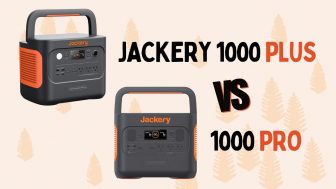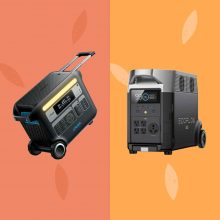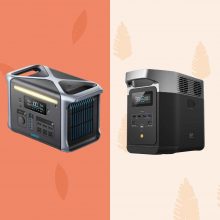- How EcoFlow Battery Technology Works
- Key Features of EcoFlow Battery Technology
- EcoFlow Battery Technology: Use Cases
- EcoFlow Product Line-up
- How EcoFlow Batteries Compare to Traditional Nickel-Cadmium and Lead-Acid Batteries
- Challenges and Limitations of EcoFlow Battery Technology
- How does EcoFlow contribute to sustainability in the energy storage industry?
- EcoFlow Sustainability Certifications and Recognitions
- Final Thoughts
- Campgrounds
- Backpacking
- Footwear
- Outdoor Gear
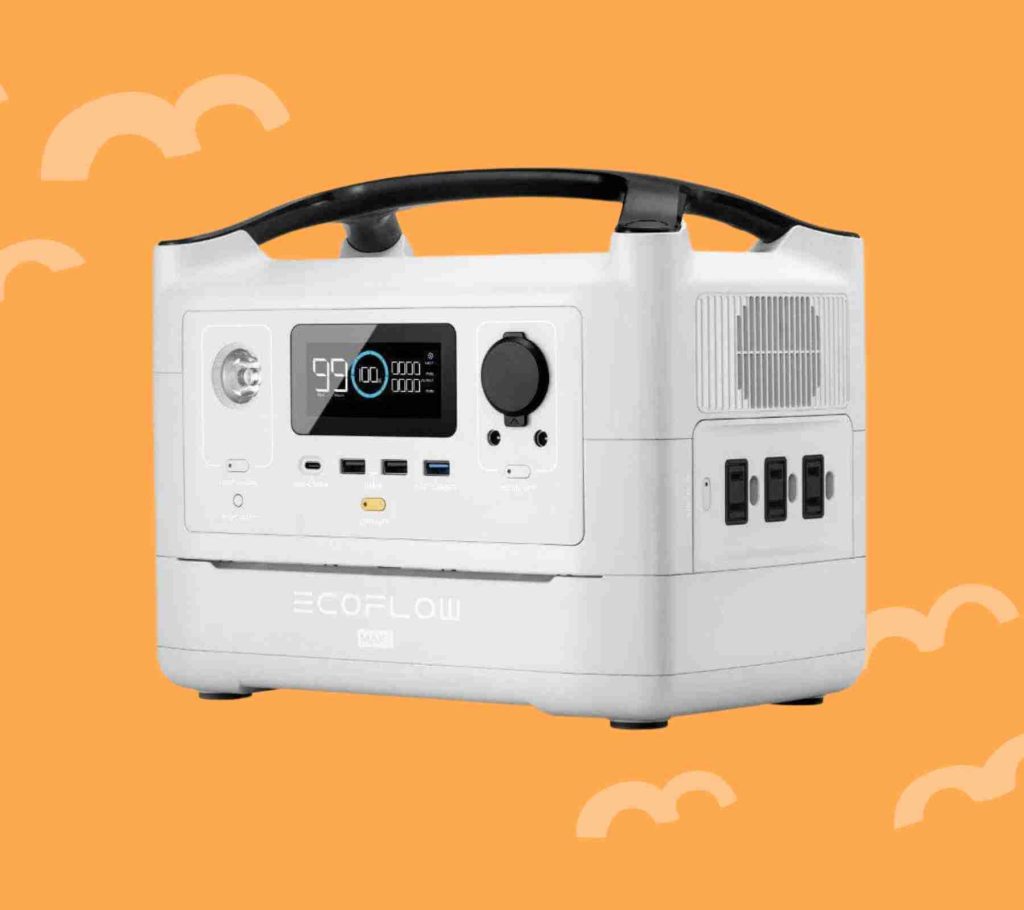
EcoFlow is a trailblazing player in the portable power industry, dedicated to making a difference through its cutting-edge battery technology. In this article, we’ll dive into the world of EcoFlow battery technology, exploring how it works, key features, applications, advantages, and more.
How EcoFlow Battery Technology Works
EcoFlow’s Battery Management System (BMS) is an important piece of its technology; facilitating the delivery of energy safely and efficiently to its portable power systems.
The BMS continually regulates voltage, current, and temperature, processes real-time data and employs a smart algorithm to prime the battery for peak performance. This sophisticated management system helps achieve high-performance, safety and longevity of EcoFlow portable power systems.
Key Features of EcoFlow Battery Technology
Battery Management System (BMS)
The Battery Management System (BMS) is a critical component of EcoFlow’s Battery Technology, which provides a number of advantages for its portable power systems, including safety, robust performance and extra longevity.
The BMS acts as the battery’s ‘brain’ by monitoring and managing the device’s overall health, temperature, charge current and voltage levels while also providing protection against extreme voltages or temperatures.
It then calculates remaining charge capacity in order to balance electrical loads across cells for optimal performance. Furthermore, it helps prevent swelling of individual cells so that energy storage remains at maximum efficiency throughout the battery’s life.
EcoFlow’s Patented X-Stream Fast Charging Technology
EcoFlow’s X-Stream tech delivers rapid charging with the ability to recharge its battery products in as little as 90 minutes. This technology optimizes the efficacy and speed of charging, thus drastically reducing the recharge time, especially compared to competitors like Jackery.
For example, Jackery’s Explorer 500 takes 5-6 hours to recharge using an AC wall outlet, or 7-8 hours using solar panels. EcoFlow takes 90 minutes using AC and 3 hours using solar panels!
The optimized speed is achieved through sophisticated algorithms that regulate energy sources for faster recharging. Moreover, the efficient voltage control delivery system stabilizes current output during recharging cycles, providing better temperature control during all stages of charging.
By combing them together with advanced electronics engineering design principles, this ensures X-Stream technology works reliably overtime with highest efficiency at all times and across various platforms including solar panel systems and regular chargers whilst protecting against potential short circuits from manual mismatches or overloads too.
Delta Pro Fast Charging Capabilities
The Delta Pro has a 1.8-hour charge time, which EcoFlow claims to be the “world’s fastest”. This impressive charging speed is achieved by combining multiple charging methods, allowing for a maximum input of 6500W. The battery can also be recharged from a wall socket in 2.7 hours and supports up to 4800W of solar input.
X-Stream Technology for Faster AC Charging
EcoFlow’s innovative X-Stream technology provides an industry-leading AC recharge rate. For example, using an integrated intelligent inverter, the DELTA Pro can efficiently recharge its 3600 watt-hour battery capacity in just 2 hours and 40 minutes at an impressive output of 1800W.
Scalable Battery Storage Options, Ranging From 2kWh to 25kWh.
EcoFlow’s batteries are expandable, meaning that instead of buying a completely new portable power station when you need more power, you can easily increase capacity in an existing machine by adding battery packs. This is one of EcoFlow’s signature differences that sets them apart from brands like Goal Zero Yeti and Jackery, which don’t offer expansion options.
EcoFlow gives users the ability to customize their power solutions with an impressive range of battery storage options, ranging from 2kWh to 25kWh. This flexibility allows users to build tailor-made power stations based on specific needs and requirements, whether you need power for a few small devices, or full-scale infrastructure to backup an entire house.
Long life cycle
EcoFlow’s portable power stations, equipped with LiFePO4 batteries, offer over 3,500 charge-discharge cycles at up to 80% capacity before experiencing any deterioration. For the typical user, this equals 10+ years of daily usage before losing charge capacity.
Versatility
Since EcoFlow battery technology is scalable, this means that it’s also versatile. You can scale up or down, adjusting capacity by adding or removing battery packs. With this ability to scale, EcoFlow battery technology can be used for just about anything, small or large.
Alongside this, EcoFlow’s patented X-Stream technology allows for fast charging, so that the portable power station never runs out of juice. This allows your devices to be seamlessly connected without too many interruptions.
For example, the x-stream can recharge to 80%+ capacity within less than 60 minutes. Thus it’s designed not only to power a variety of appliances, but also deliver power over extended periods of time.
Durability
EcoFlow’s batteries have an IP65 certification, meaning they are dust-proof and protected against water spray from any direction.
Lithium iron phosphate (LiFePO4) used in DELTA Pro and RIVER 2 Max
Lithium iron phosphate (LiFePO4) batteries are a key component in EcoFlow’s DELTA Pro and RIVER 2 Max power stations. These batteries offer several advantages, but also have a few limitations.
| LiFePO4 Pros | LiFePO4 Cons |
|---|---|
| LiFePO4 batteries have a Battery Management System (BMS) to monitor performance and optimal operating efficiency. | LiFePO4 batteries are more expensive than other battery types. |
| The BMS calculates the LiFePO4 battery charge status to prevent overcharging. | LiFePO4 batteries require a specialized charger to manage the complex charging and discharging process. |
| LiFePO4 batteries have a longer life cycle than nickel cadmium batteries, with some extending up to 3,500 charge cycles. |
Nickel Cadium (NiCd) used in RIVER 2 and DELTA Max
Nickel Cadmium (NiCd) batteries are primarily used in EcoFlow’s RIVER 2 and DELTA Max models. These batteries have their own unique set of advantages and disadvantages when compared to lithium-ion batteries.
| NiCd Pros | NiCd Cons |
|---|---|
| NiCd batteries have a long lifespan and can withstand more charge-discharge cycles compared to lithium-ion batteries. | NiCd batteries have a lower energy density compared to lithium-ion batteries, therefore, they can store and deliver less energy. |
| NiCd batteries are more resistant to extreme temperatures, thus can operate in a wider range of temperatures compared to lithium-ion batteries. | NiCd batteries have a higher self-discharge rate compared to lithium-ion batteries, which means they lose charge when not in use at a faster rate. |
| NiCd batteries are considered less environmentally friendly due to the toxic nature of the cadmium used in their construction compared to lithium-ion batteries. | |
| NiCd batteries have a lower energy efficiency compared to lithium-ion batteries, meaning they provide less power output for the same amount of stored energy. |
In summary, while NiCd batteries used in the RIVER 2 and DELTA Max offer durability and temperature resistance, they’re also less energy efficient, have a shorter lifespan and negative environmental impacts.
EcoFlow Battery Technology: Use Cases
EcoFlow’s battery technology can be used in a multitude of scenarios, including:
- Portable Power Stations: EcoFlow’s batteries are perfect for powering outdoor activities, such as camping, tailgating, and off-grid living.
- Emergency Backup Power: In times of power outages or natural disasters, EcoFlow’s portable power stations can provide a reliable source of electricity for essential devices and appliances.
- Renewable Energy Storage: EcoFlow’s batteries can be paired with solar panels to store and utilize clean energy.
Case Study: Using the EcoFlow Delta Pro as a Home Backup Solution
In this video, a DIY home improvement enthusiast demonstrates how the EcoFlow Delta Pro can be used to provide 240 volts of electricity, which is comparable to the output of a conventional gas generator.
The video creator, Silver Cymbal, is a home improvement YouTube channel with more than 790,000 subscribers. The channel includes highly technical videos on plumbing, heating, power generators and other DIY home improvement information.
Note: You should consult with a licensed electrician before integrating a system like this into your home.
Installation Process
- If you’re integrating the EcoFlow Delta Pro with a gas generator, install a 30 amp switch to alternate between the two generator inlets.
- Connect two EcoFlow Delta Pros and one expansion battery each.
- Use a standard Reliance 30 amp generator plug and a generator cord to connect the system to the Hub device.
- Install a three-pole double throw switch to control the connection between the electric panel and the battery backup system.
- After you check that all the connections are secure, turn on the 240-volt adapter on the EcoFlow Delta Pro.
- Test the system.
EcoFlow Product Line-up
High Capacity Portable Power Stations
EcoFlow DELTA Pro
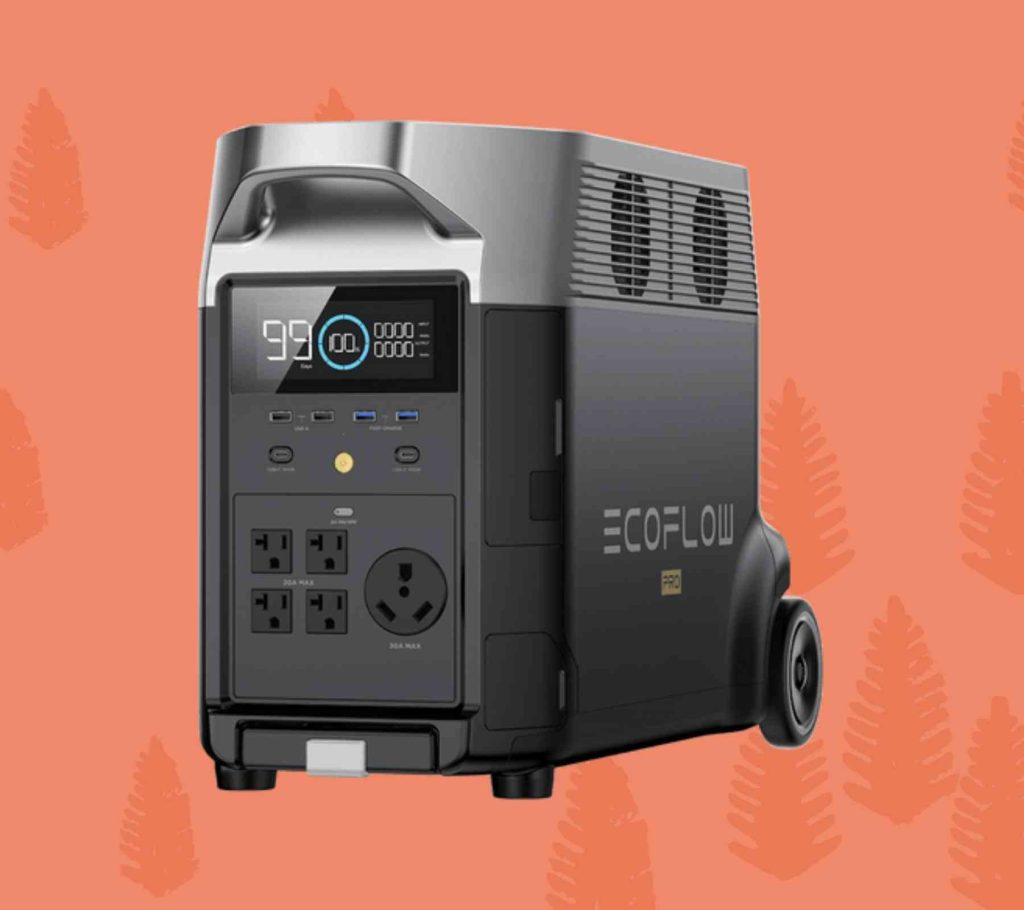
(starting April 1, 2023 each order includes a free home backup kit Transfer Switch while supplies last)
- Capacity: 3,600Wh to 25,000Wh
- Battery Type: LiFePO4
- Output: 3600W (Surge 7200W)
- Solar Input: 1600W
- Ports: 15 Outlets, AC, 12V, DC, USB-A, USB-A Fast Charge, USB-C, Anderson Port
- Storage Temperature: 14°F – 113°F (-10°C – 45°C)
- Operating Temperature: 68℉ – 86℉ (20℃ – 30℃)
- Weight: 99 lbs (45 kg)
- Lifespan:
- Bonus: Bluetooth, WiFi, Mobile App
EcoFlow DELTA Max (2000)
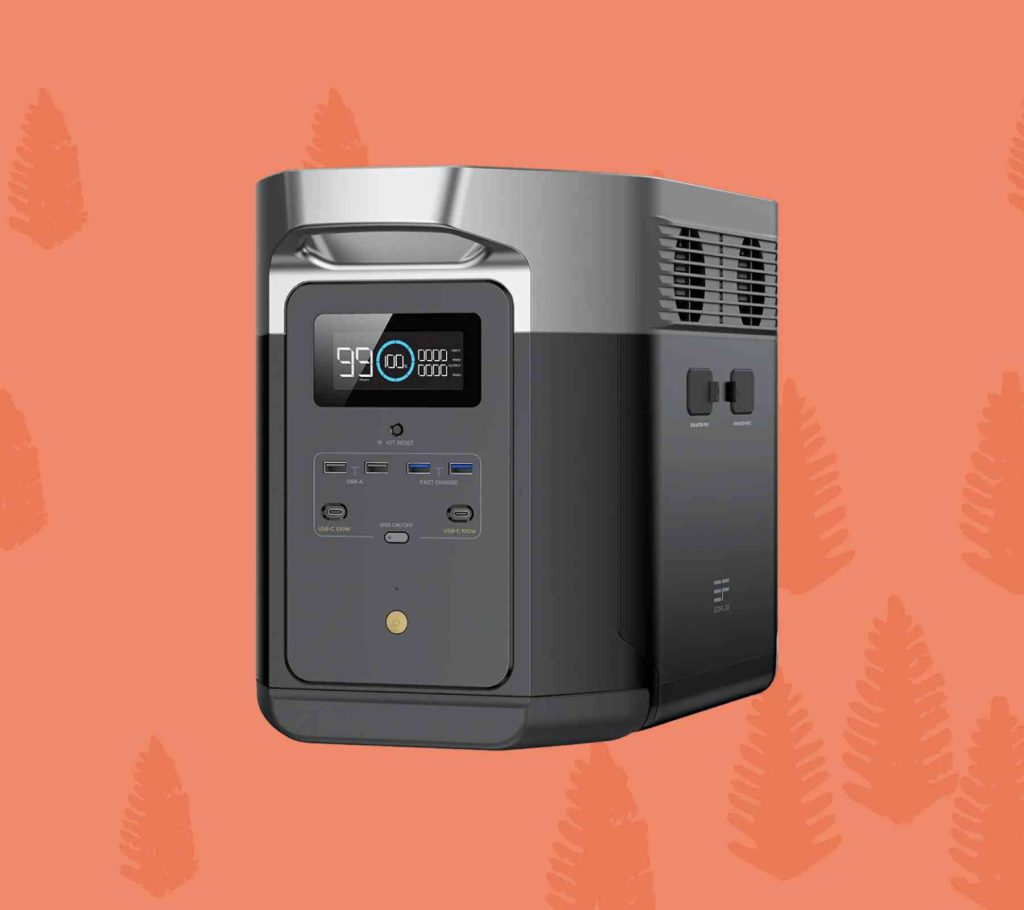
- Capacity: 2,016Wh to 6,048Wh
- Battery Type: Li-ion NCM
- Output: 2400W (Surge 5000W)
- Solar Input: 800W
- Ports: 15 Outlets, AC, DC, USB-A, USB-A Fast Charge, USB-C
- Storage Temperature: -4°F – 113°F (-20°C – 45°C)
- Operating Temperature: 68°F – 86°F (20°C – 30°C)
- Weight: 48 lbs (22 kg)
- Lifespan: 800 cycles to 80% capacity
- Bonus: Bluetooth, WiFi, Mobile App
Mid Capacity Portable Power Stations
EcoFlow DELTA (1300)
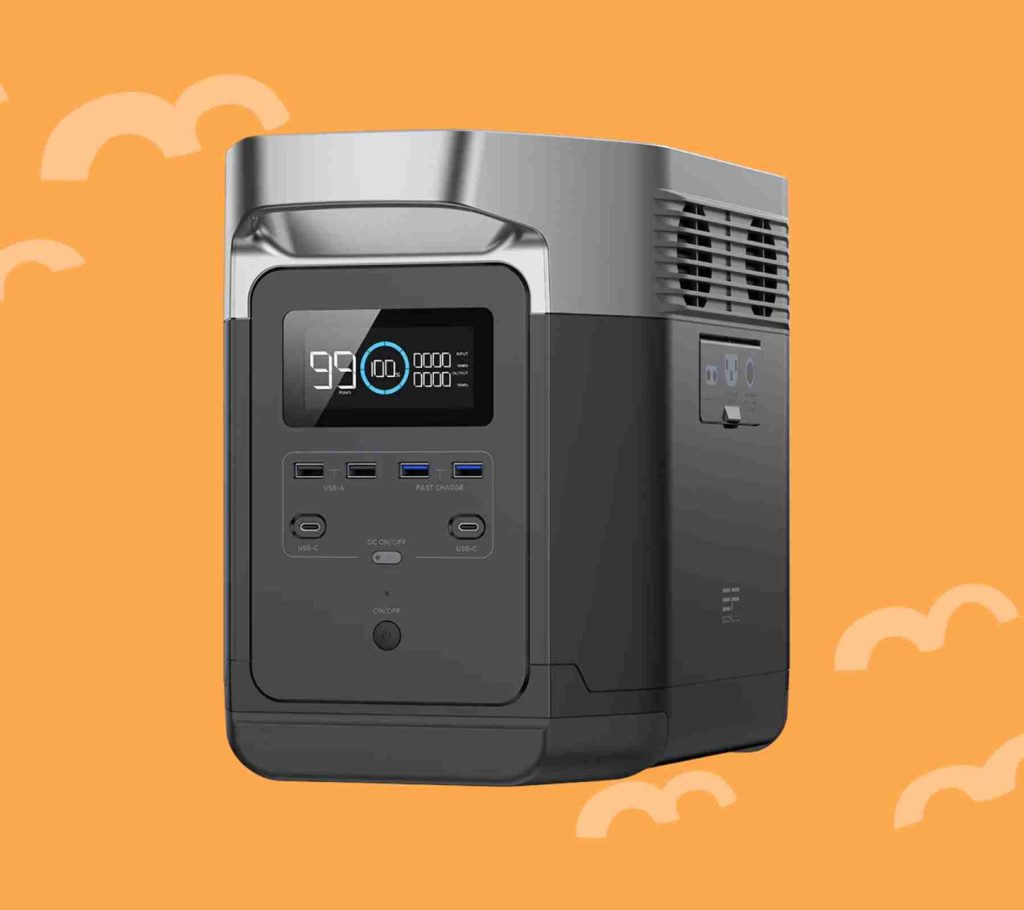
- Capacity: 1,260Wh
- Battery Type: Li-ion NCM
- Output: 1800W (Surge 3300W)
- Solar Input: 400W
- Ports: 13 Outlets, AC, DC, USB-A, USB-A Fast Charge, USB-C
- Storage Temperature: -4°F – 113°F (-20°C to 45°C)
- Operating Temperature: 68°F – 86°F (20°C – 30°C)
- Weight: 30.9 lbs (14 kg)
- Lifespan: 800 cycles to 80% capacity
EcoFlow DELTA 2
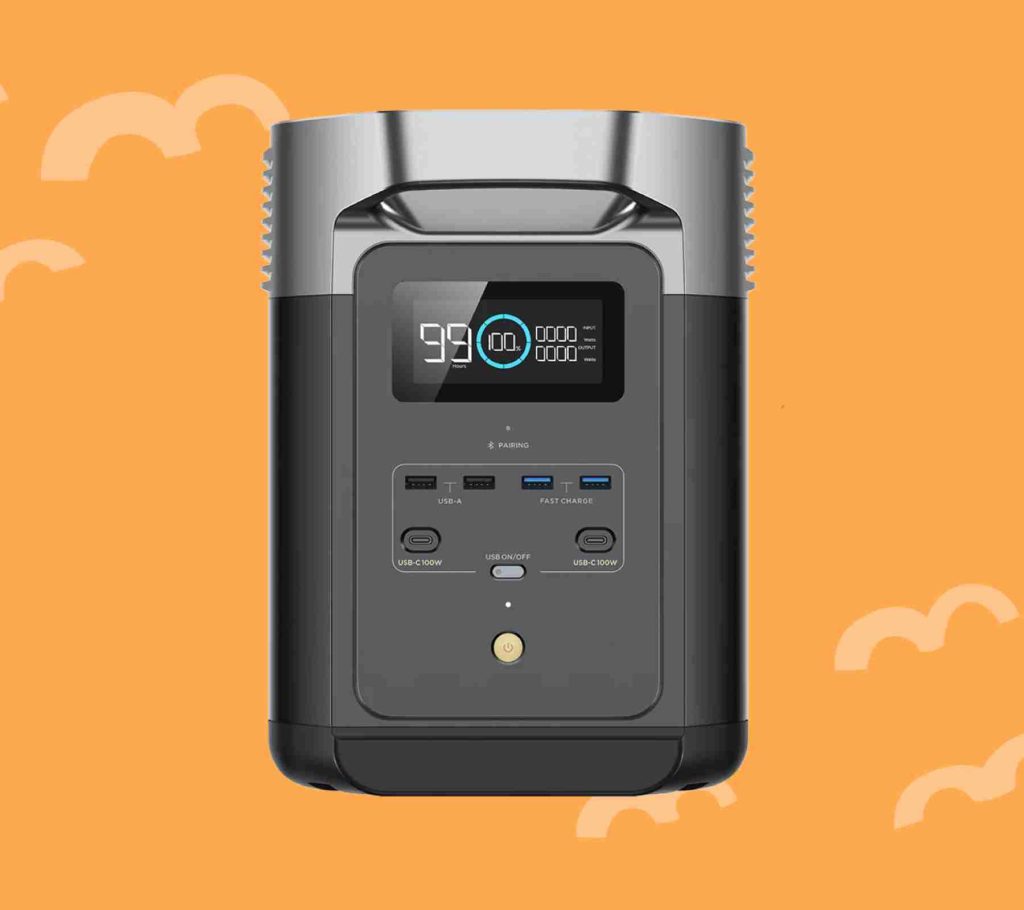
- Capacity: 1,024Wh
- Battery Type: LiFePO4
- Output: 1800W (Surge 2700W)
- Solar Input: 500W
- Ports: 15 Outlets, AC, DC, USB-A, USB-A Fast Charge, USB-C
- Storage Temperature: -4°F – 113°F (-20°C to 45°C)
- Operating Temperature: 68°F – 86°F (20°C – 30°C)
- Weight: 27 lbs (12 kg)
- Lifespan: 3,000 cycles to 80%+ capacity
- Bonus: Bluetooth, WiFi, Mobile App
Low Capacity Portable Power Stations
EcoFlow RIVER 2
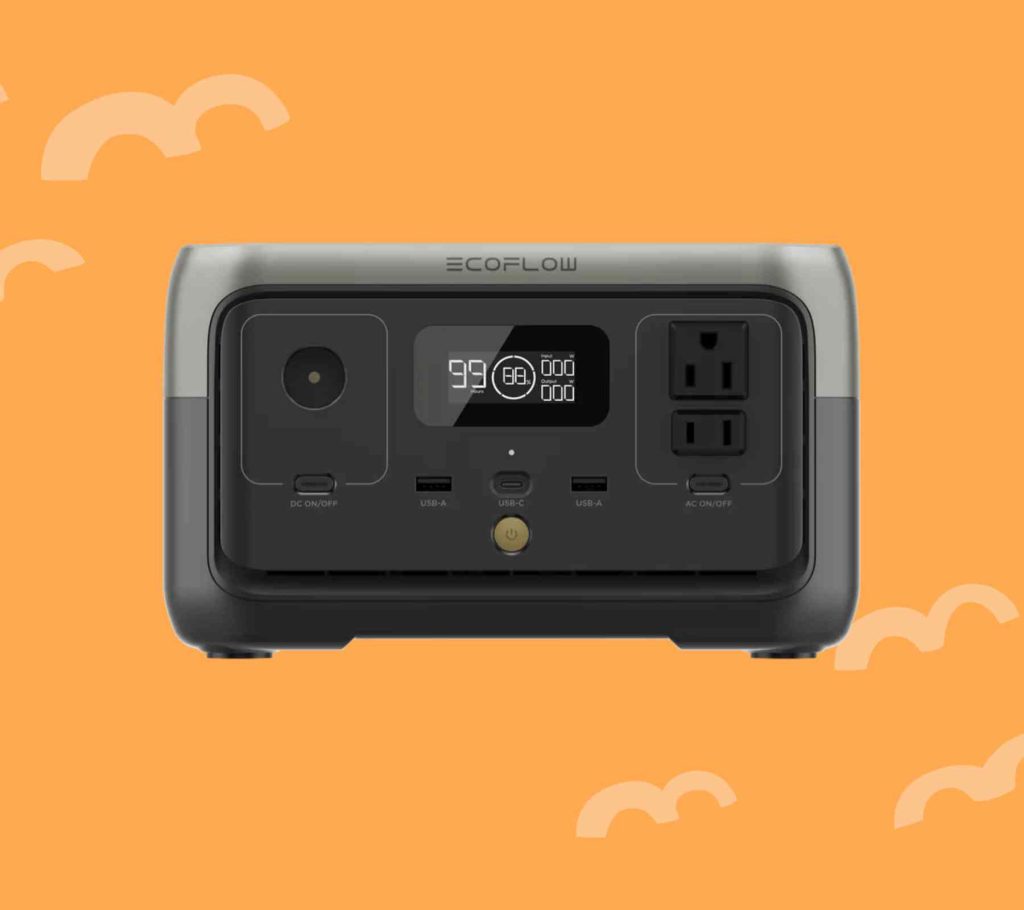
- Capacity: 256Wh
- Battery Type: LiFePO4
- Output: 300W (Surge 600W)
- Solar Input: 110W
- Ports: 6 Outlets
- Storage Temperature: -4°F – 113°F (-20°C to 45°C)
- Operating Temperature: 68°F – 86°F (20°C – 30°C)
- Weight: 7.7 lbs (3.5 kg)
- Lifespan: 3,000 cycles to 80% capacity
- Bonus: Mobile App
EcoFlow RIVER 2 Max
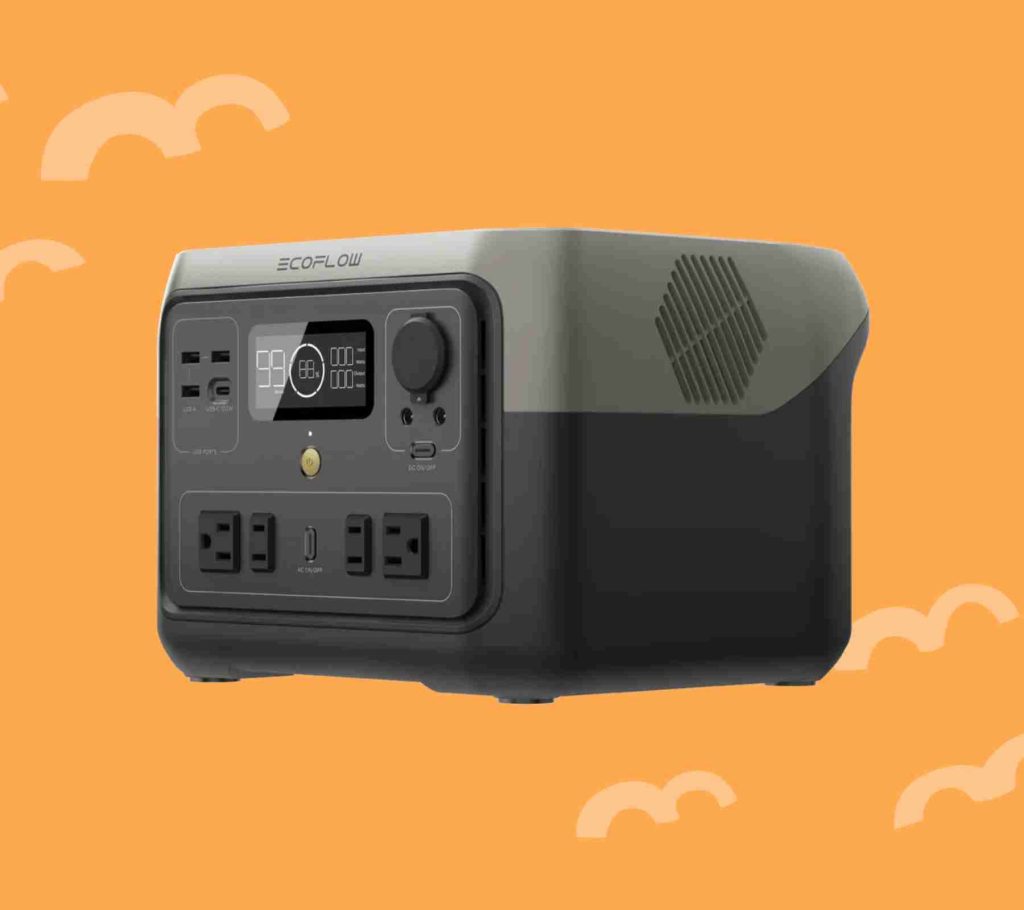
- Capacity: 512Wh
- Battery Type: LiFePO4
- Output: 500W (Surge 1000W)
- Solar Input: 220W
- Ports: 11 Outlets
- Storage Temperature: -4°F – 113°F (-20°C to 45°C)
- Operating Temperature: 68°F – 86°F (20°C – 30°C)
- Weight: 13.4 lbs (6.1 kg)
- Lifespan: 3,000 cycles to 80% capacity
- Bonus: Mobile App
EcoFlow RIVER Max Plus

- Capacity: 720Wh
- Battery Type: Li-ion NCM
- Output: 600W (Surge 1800W)
- Solar Input: 200W
- Ports: 10 Outlets, AC, DC, USB-A, USB-A Fast Charge, USB-C
- Storage Temperature: -4°F – 113°F (-20°C to 45°C)
- Operating Temperature: 68°F – 86°F (20°C – 30°C)
- Weight: 17.6 lbs (8 kg)
- Lifespan: 800 cycles to 80% capacity
- Bonus: Mobile App
EcoFlow DELTA mini
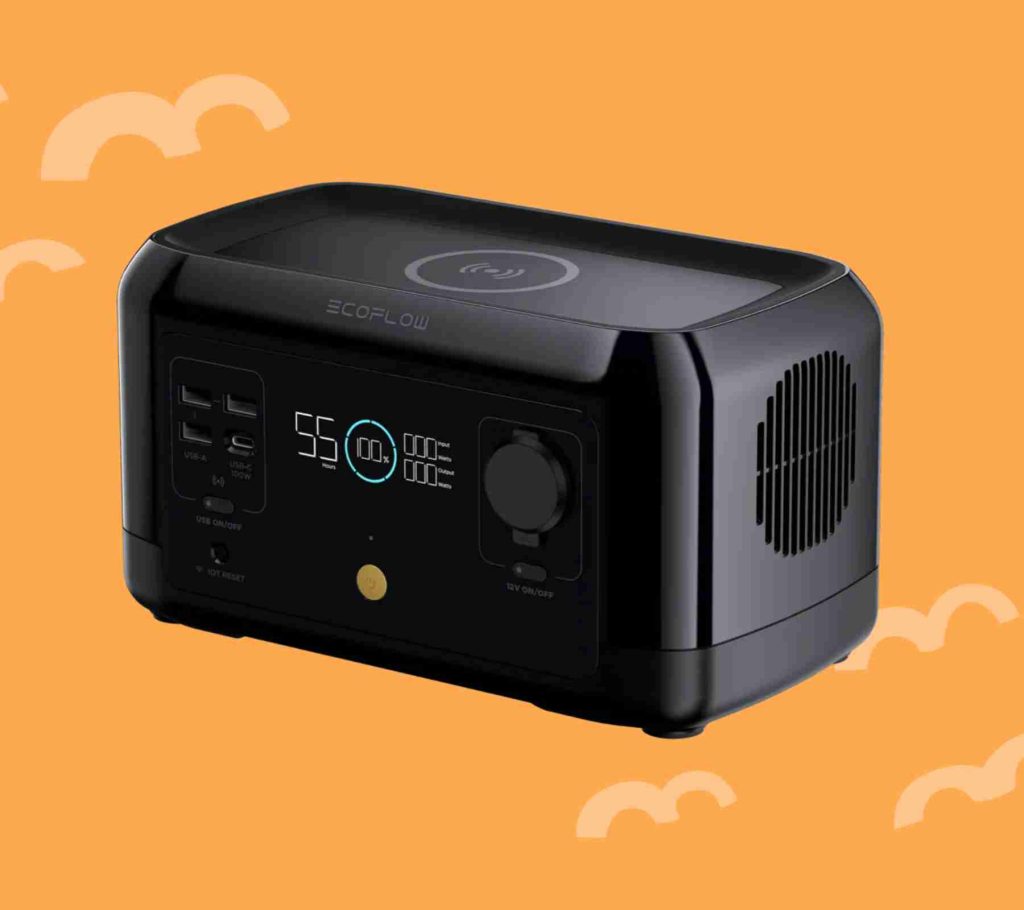
- Capacity: 882Wh
- Battery Type: Li-ion NCM
- Output: 1400W (Surge 2100W)
- Solar Input: 300W
- Ports: 12 Outlets, AC, DC, USB-A, USB-A Fast Charge, USB-C
- Storage Temperature: -4°F – 113°F (-20°C to 45°C)
- Operating Temperature: 68°F – 86°F (20°C – 30°C)
- Weight: 23.6 lbs (10.7 kg)
- Lifespan: 800 cycles to 80%+ capacity
How EcoFlow Batteries Compare to Traditional Nickel-Cadmium and Lead-Acid Batteries
EcoFlow batteries and traditional batteries differ in their capacity, efficiency, cycle life, cost, safety, among other things. Technology: EcoFlow uses LiFePO4 (Lithium Iron Phosphate) or NCM (Lithium Nickel Cobalt Manganese Oxide) batteries, in lieu of lead-acid or nickel-metal hydride. Energy Density and Efficiency: EcoFlow lithium-ion batteries have a higher energy density than traditional batteries, can store more energy in a smaller package, charge for longer periods and deliver more usual energy. For example, lithium energy density is around 300 Wh/kg, and traditional batteries energy density is approximately 50-100 Wh/kg. Cycle Life: EcoFlow lithium battery cells have a longer lifespan than traditional batteries. A cycle life refers to the number of times a battery can be charged and discharged before its storage capacity decreases significantly. Lithium-ion batteries can offer thousands of cycles, while lead-acid and nickel-metal hydride batteries have a much shorter lifespan, especially with consistent usage. Charging Rate: EcoFlow lithium-ion batteries can recharge faster than many competing portable power stations, and rechargeable nickel cadmium batteries. For example, the company states that their 3600 watt-hour Delta Pro can be fully recharged in less than 2 hours, which is one of the fastest times on the market.Challenges and Limitations of EcoFlow Battery Technology
EcoFlow battery technology has several challenges and limitations that include: Cost: Lithium-ion batteries can be more expensive than traditional batteries because they require scarce materials like cobalt and lithium and are more expensive to manufacture. Availability: Lithium-ion batteries are created using finite raw resources, such as lithium and cobalt. Safety: While lithium-ion batteries are generally considered safe, there have been reports of “thermal runaway”, which can lead to explosions or fire. Temperature Sensitivity: Lithium-ion batteries are sensitive to extreme temperatures and must be stored at a specific temperature range. For example, EcoFlow batteries must be stored in temps between 14°F ~ 113°F (-10°C ~ 45°C) and operated in temps between 68°F – 86°F (20℃-30℃). Recycling and Disposal: Although recycling options are becoming more available, these batteries are not as easy to recycle as other battery types like lead-acid batteries. Lithium-ion batteries are considered more environmentally friendly compared to lead-acid because of their longer life cycle, higher efficiency, and the absence of toxic heavy metals like lead and sulfuric acid. However, it’s estimated that only 5% of lithium-ion batteries actually get recycled. Energy Density Plateau: Although lithium-ion batteries can store more energy in a much smaller package, there is a limit to how much energy density can be achieved. An example of this is electric vehicle lithium-ion batteries, which can travel between 400 – 500 miles before needing a recharge.How does EcoFlow contribute to sustainability in the energy storage industry?
EcoFlow’s battery technology contributes to sustainability in several ways, including: Reduced Cost: The cost of energy storage is decreasing, which means that owning home power solutions are becoming more affordable. This is helping to transition towards a greener economy, and EcoFlow’s innovative energy storage technologies are helping to drive this trend forward. Reduced Waste: EcoFlow’s batteries can be replaced and upgraded, allowing users to customize their power system as needed, while also reducing the amount of electronic waste that is created. Longer Life Span: EcoFlow’s longer lithium battery lifespan helps reduce replacement costs and improves performance. More Power: EcoFlow’s products use pure sine wave inverters that can power even the most energy-demanding appliances and devices. This means users can rely on clean and renewable energy sources without worrying about running out of power when they need it the most. Safety Protection: EcoFlow’s products are equipped with state-of-the-art battery protection systems, including over-voltage, over-temperature, over-current, and short-circuit protection. These features ensure that the batteries have a longer lifespan and lower environmental impact.EcoFlow Sustainability Certifications and Recognitions
Yes, EcoFlow has received third-party certifications and recognitions for its sustainability efforts. Here are a few examples: TÜV Rheinland: EcoFlow’s RIVER 2 series was awarded the “Reliable Charger” certification by TÜV Rheinland, a global provider of independent testing and inspection services. UL Certification: EcoFlow’s products are UL certified, which means that they have been tested and certified for safety, sustainability, and performance by the global safety science organization. CES 2021 Innovation Awards Honoree: EcoFlow was named a CES 2021 Innovation Awards Honoree for its Delta Pro mobile power station, which is designed to provide clean and reliable power for off-grid adventures and emergency backup. iF DESIGN AWARD: EcoFlow’s Delta power station was awarded the iF DESIGN AWARD 2020 for its innovative design and sustainable features.Final Thoughts
EcoFlow battery technology offers a lot of advantages, including fast charging, scalability, safety, and long life cycles. With its versatile catalog of products, EcoFlow creates solutions for any number of uses, including off-grid living, camping, vanlife and home emergency power backup. The future of EcoFlow battery technology is promising as the company continues to innovate and meet the growing demand for clean and sustainable energy solutions.Fair Trade Finder makes product and service recommendations, based on thorough research and comparison analysis. Read more.
Campgrounds
- The Best Beach Camping in California
- The Best Campgrounds in Northern California
- The Best Wilderness Camping in California
- The Best Campsites in Washington
- 10 Best Campgrounds in Southern California
- The Best Campsites in Oregon
Backpacking
- The Best Yosemite Backpacking Trails
- The Ultimate Guide to Backpacking
- Best Backpacking in Colorado
- The Best California Backpacking Trips
- The Best Backpacking In Washington
- Best Backpacking Trails in the US
Footwear
- 20+ of the Best Vegan Sneaker Brands
- The Best Vegan Sandals Brands
- Sustainable Hiking Shoes Made From Recycled Materials




